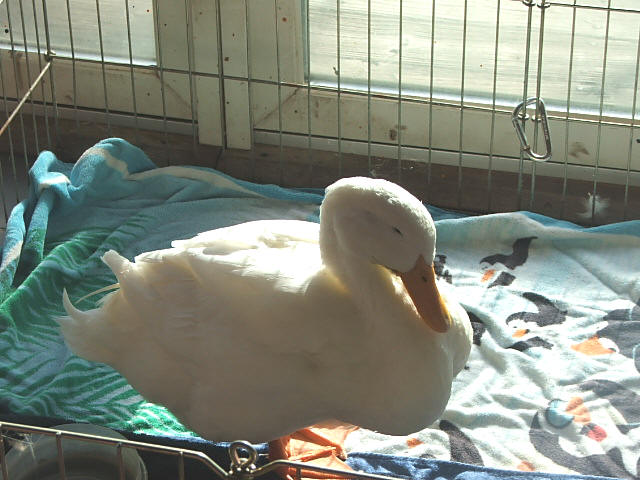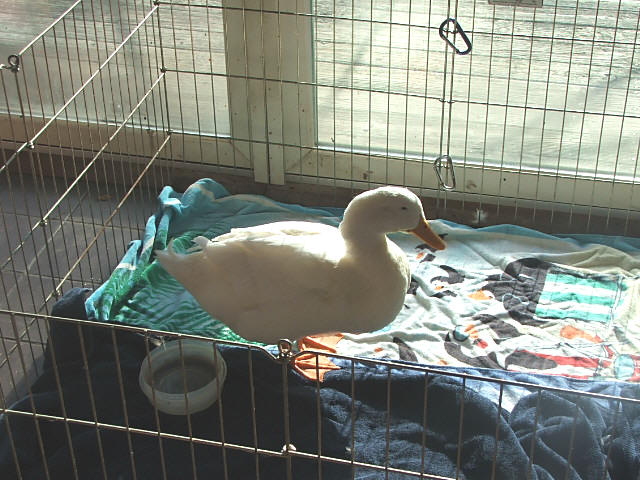I haven't been in
the diary pages lately because Young Matthew has
fallen ill. His lethargy appeared last Wednesday the
11th, so I started him on antibiotics. I saw him
shaking his tail feathers a lot while swimming on
Thursday and suspected a prolapse, but didn't see
anything when I did a quick check. By Friday morning
he was in the vet's office. He had a slight tissue
prolapse, but that was it.
We went from Dr.
Otka's office up the road to Dr. Brown's office
because Dr. Otka doesn't have his new digital x-ray
yet. Our suspicion is that spring fever has him
flushed with excess hormones that have caused
swelling to his testes and other reproductive
tissues. Since he's 10 years old, cancer is
possible, but she didn't see it on his x-ray.
He isn't eating,
so I have to syringe feed him 30 mls, three times a
day. I make him fresh, organic veggie juice using my
juicer. It contains broccoli, celery, leaf lettuce,
brussel sprouts, asparagus and carrots. I mix some
vet prescribed "Critical Care" into the mix along
with some A/D cat food for protein.
On Saturday
(yesterday) his penis prolapsed about a half an inch
and it got really cold (8 degrees last night), so
Matthew's in the house so he's safe from frostbite.
Dr. Brown called yesterday and today to check on
him. She called today to say she spoke with Dr.
Echols (waterfowl vet expert) about Young Matthew
and he advised to keep him away from other
ducks--especially females who cause more hormones to
flush through his system. He advised that we avoid
handling or petting him except when necessary
(during syringe feeding) and to especially avoid
petting his back.
While Matthew
usually likes attention, he pokes our hands whenever
we move anywhere near him to let us know he's not
feeling well and doesn't want to be touched, so no
worries about too much handling.
Dr. Echols said it
is rarely cancer and swelling is likely to come down
in 3-5 days. In the meantime he doesn't want him on
any inflammatory meds anymore, so we took him off of
Rimadyl. He said it doesn't really help much and can
risk his kidneys and liver. He said while Lupron is
an option (it reduces the swelling of reproductive
organs), it only has mild results and waiting it out
is often the best option. In addition it is very
cost inhibitive ($300 for one injection for a 4.5 lb
duck).
If Matthew begins
to improve, then he won't need an ultrasound on
Tuesday, but if he doesn't the ultrasound can make
sure there isn't anything else going on in there,
like cancer.
Today Young
Matthew had a nice warm bath and then I used the
blow-dryer while he preened. He did a good job of
oiling up. He's been relaxing in a pen in our
sunroom all day and will soon move to the spare
bathroom (because the sun room is starting to get
chilly).



